Greg Norman
FOX NEWS
Thu, February 23, 2023
The operators of the Norfolk Southern train involved in a toxic derailment in East Palestine, Ohio, earlier this month received a "critical audible alarm message instructing the crew to slow and stop the train to inspect a hot axle," according to a newly released National Transportation Safety Board (NTSB) report Thursday.
The preliminary report comes as NTSB Chair Jennifer Homendy said during a press conference that the Feb. 3 disaster "was 100% preventable."
"We call things accidents. There is no accident. Every single event that we investigate is preventable," she said. "So our hearts are with you know, that the NTSB has one goal and that is safety and ensuring that this never happens again."
The report said that after hearing a warning from the hot bearing detector on Train 32N, the train’s engineer, who Homendy said already was braking due to a train ahead, "increased the dynamic brake application to further slow and stop the train."
"The function of the HBD is to detect overheated bearings and provide audible real-time warnings to train crews," the report said.
"Train 32N passed three HBD systems on its trip before the derailment," adding that at the third system, it recorded "the suspect bearing's temperature at 253°F above ambient."
"After the train stopped, the crew observed fire and smoke and notified the Cleveland East dispatcher of a possible derailment. With dispatcher authorization, the crew applied handbrakes to the two railcars at the head of the train, uncoupled the head-end locomotives, and moved the locomotives about 1 mile from the uncoupled railcars," the NTSB wrote. "Responders arrived at the derailment site and began response efforts."
About 15,000 pounds of contaminated soil and 1.1 million gallons of contaminated water have been excavated from the site of the derailment, Norfolk Southern said Monday.
Dozens of rail cars, including 11 carrying toxic chemicals, derailed as the train passed through the town on the Ohio-Pennsylvania border. Officials conducted a controlled release of vinyl chloride three days after the derailment to avoid an explosion.
Homendy announced Thursday that the NTSB will hold a "rare investigative field hearing this spring in East Palestine" to gather more information on the incident.

Transportation Secretary Pete Buttigieg speaks with a U.S. DOT official at the site of the East Palestine, Ohio, train derailment on Thursday.
"We don't have investigative hearings often. It is rare, but we will question invited witnesses," she said. "We have four goals for conducting an investigative field hearing: number one, inform the public. Number two, collect factual information from witnesses. Number three, discuss possible solutions. And number four, build consensus for change."
EAST PALESTINE MAYOR ASKS FOR ANNUAL COMMUNITY HEALTH CHECKS, SHARES CONCERNS ABOUT RASHES, LONG-TERM EFFECTS
In the report, the NTSB said at the "time of the accident, visibility conditions were dark and clear; the weather was 10°F with no precipitation."
Investigators wrote that the train had 149 railcars, 20 of which were "hazardous materials tank cars transporting combustible liquids, flammable liquids, and flammable gas, including vinyl chloride." A total of 38 cars derailed.
While the train's crew was decelerating after hearing the hot bearing detector warning, the train derailed while traveling at 47 mph and "an automatic emergency brake application initiated," causing the locomotive to come to a stop, NTSB investigators said.
Two days after the Feb. 3 derailment, responders extinguished the fire, but five cars carrying "115,580 gallons of vinyl chloride continued to concern authorities because the temperature inside one tank car was still rising," the NTSB said, leading to the controlled release.
Four of the cars containing the chemical were reported by the NTSB to be connected to each other, while the fifth was located in another part of the train.
"Responders scheduled a controlled venting of the five vinyl chloride tank cars to release and burn the vinyl chloride, expanded the evacuation zone to a 1-mile by 2-mile area, and dug ditches to contain released vinyl chloride liquid while it vaporized and burned," the report said.
"NTSB investigators identified and examined the first railcar to derail, the 23rd railcar," the report also said. "Surveillance video from a local residence showed what appeared to be a wheel bearing in the final stage of overheat failure moments before the derailment. The wheel bearing and affected wheel set have been collected as evidence and will be examined by the NTSB."
"The vinyl chloride tank car top fittings, including the relief valves, were also removed and examined by the NTSB on scene," the report added. "The top fittings will be shipped to Texas for testing under the direction of the NTSB."

This video screenshot released by the U.S. National Transportation Safety Board shows the site of the derailed freight train in East Palestine, Ohio.
Investigators from the agency returned to the derailment site on Tuesday "to examine each [decontaminated] hazardous material tank car, document damage, and secure evidence for laboratory analysis."
"Future investigative activity will focus on the wheel set and bearing; tank car design and derailment damage; a review of the accident response, including the venting and burning of the vinyl chloride; railcar design and maintenance procedures and practices; NS use of wayside defect detectors; and NS railcar inspection practices," the report concluded.
Homendy also said Thursday that the NTSB "had no role in the decision-making or carrying out of the venting burn.
"The Federal Railroad Administration has guidance for how to conduct venting burns," she said. "So as part of our investigation, we will evaluate whether the vent and burn was carried out according to guidance and whether that guidance needs to be updated."
Fox News' Paul Best contributed to this report.
Thu, February 23, 2023
The operators of the Norfolk Southern train involved in a toxic derailment in East Palestine, Ohio, earlier this month received a "critical audible alarm message instructing the crew to slow and stop the train to inspect a hot axle," according to a newly released National Transportation Safety Board (NTSB) report Thursday.
The preliminary report comes as NTSB Chair Jennifer Homendy said during a press conference that the Feb. 3 disaster "was 100% preventable."
"We call things accidents. There is no accident. Every single event that we investigate is preventable," she said. "So our hearts are with you know, that the NTSB has one goal and that is safety and ensuring that this never happens again."
The report said that after hearing a warning from the hot bearing detector on Train 32N, the train’s engineer, who Homendy said already was braking due to a train ahead, "increased the dynamic brake application to further slow and stop the train."
"The function of the HBD is to detect overheated bearings and provide audible real-time warnings to train crews," the report said.
"Train 32N passed three HBD systems on its trip before the derailment," adding that at the third system, it recorded "the suspect bearing's temperature at 253°F above ambient."
"After the train stopped, the crew observed fire and smoke and notified the Cleveland East dispatcher of a possible derailment. With dispatcher authorization, the crew applied handbrakes to the two railcars at the head of the train, uncoupled the head-end locomotives, and moved the locomotives about 1 mile from the uncoupled railcars," the NTSB wrote. "Responders arrived at the derailment site and began response efforts."
About 15,000 pounds of contaminated soil and 1.1 million gallons of contaminated water have been excavated from the site of the derailment, Norfolk Southern said Monday.
Dozens of rail cars, including 11 carrying toxic chemicals, derailed as the train passed through the town on the Ohio-Pennsylvania border. Officials conducted a controlled release of vinyl chloride three days after the derailment to avoid an explosion.
Homendy announced Thursday that the NTSB will hold a "rare investigative field hearing this spring in East Palestine" to gather more information on the incident.

Transportation Secretary Pete Buttigieg speaks with a U.S. DOT official at the site of the East Palestine, Ohio, train derailment on Thursday.
"We don't have investigative hearings often. It is rare, but we will question invited witnesses," she said. "We have four goals for conducting an investigative field hearing: number one, inform the public. Number two, collect factual information from witnesses. Number three, discuss possible solutions. And number four, build consensus for change."
EAST PALESTINE MAYOR ASKS FOR ANNUAL COMMUNITY HEALTH CHECKS, SHARES CONCERNS ABOUT RASHES, LONG-TERM EFFECTS
In the report, the NTSB said at the "time of the accident, visibility conditions were dark and clear; the weather was 10°F with no precipitation."
Investigators wrote that the train had 149 railcars, 20 of which were "hazardous materials tank cars transporting combustible liquids, flammable liquids, and flammable gas, including vinyl chloride." A total of 38 cars derailed.
While the train's crew was decelerating after hearing the hot bearing detector warning, the train derailed while traveling at 47 mph and "an automatic emergency brake application initiated," causing the locomotive to come to a stop, NTSB investigators said.
Two days after the Feb. 3 derailment, responders extinguished the fire, but five cars carrying "115,580 gallons of vinyl chloride continued to concern authorities because the temperature inside one tank car was still rising," the NTSB said, leading to the controlled release.
Four of the cars containing the chemical were reported by the NTSB to be connected to each other, while the fifth was located in another part of the train.
"Responders scheduled a controlled venting of the five vinyl chloride tank cars to release and burn the vinyl chloride, expanded the evacuation zone to a 1-mile by 2-mile area, and dug ditches to contain released vinyl chloride liquid while it vaporized and burned," the report said.
"NTSB investigators identified and examined the first railcar to derail, the 23rd railcar," the report also said. "Surveillance video from a local residence showed what appeared to be a wheel bearing in the final stage of overheat failure moments before the derailment. The wheel bearing and affected wheel set have been collected as evidence and will be examined by the NTSB."
"The vinyl chloride tank car top fittings, including the relief valves, were also removed and examined by the NTSB on scene," the report added. "The top fittings will be shipped to Texas for testing under the direction of the NTSB."

This video screenshot released by the U.S. National Transportation Safety Board shows the site of the derailed freight train in East Palestine, Ohio.
Investigators from the agency returned to the derailment site on Tuesday "to examine each [decontaminated] hazardous material tank car, document damage, and secure evidence for laboratory analysis."
"Future investigative activity will focus on the wheel set and bearing; tank car design and derailment damage; a review of the accident response, including the venting and burning of the vinyl chloride; railcar design and maintenance procedures and practices; NS use of wayside defect detectors; and NS railcar inspection practices," the report concluded.
Homendy also said Thursday that the NTSB "had no role in the decision-making or carrying out of the venting burn.
"The Federal Railroad Administration has guidance for how to conduct venting burns," she said. "So as part of our investigation, we will evaluate whether the vent and burn was carried out according to guidance and whether that guidance needs to be updated."
Fox News' Paul Best contributed to this report.
NTSB: Crew tried to stop train before East Palestine derailment
NTSB chair: East Palestine derailment was '100% preventable'
Christopher Wilson
·Senior Writer
Thu, February 23, 2023
While not reaching a conclusive reason as to why a Norfolk Southern train derailed in Ohio earlier this month, the National Transportation Safety Board said Thursday morning that it was continuing to look at an overheated wheel bearing on the first car to go off the tracks.
In a preliminary report, the NTSB wrote that it had identified “a wheel bearing in the final stage of overheat failure moments before the derailment” on the 23rd car, the first to derail. The report said “hot bearing detectors” picked up a temperature 253 degrees above normal prior to the derailment. The train was traveling at 47 mph, just below the 50 mph speed limit.
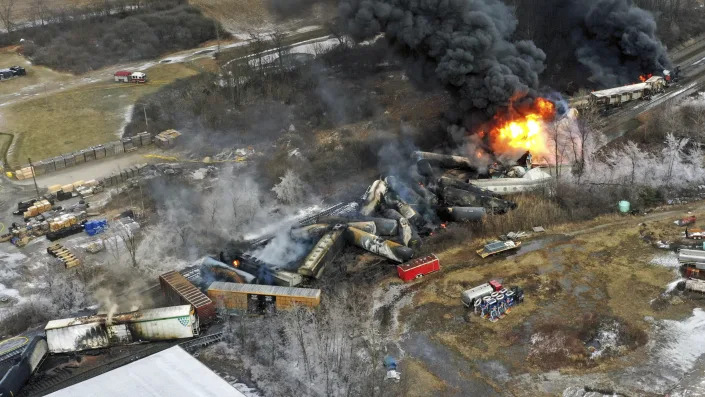
Portions of a Norfolk Southern freight train that derailed the previous night in East Palestine, Ohio, still on fire on Feb. 4. (Gene J. Puskar/AP)
Sensors showed the bearing heating up for miles before the crash, but it spiked sharply immediately before the accident. The crew heeded the final warning and tried to stop the train for an inspection.
“After the train stopped, the crew observed fire and smoke and notified the Cleveland East dispatcher of a possible derailment,” read the report. “With dispatcher authorization, the crew applied handbrakes to the two railcars at the head of the train, uncoupled the head-end locomotives, and moved the locomotives about 1 mile from the uncoupled railcars. Responders arrived at the derailment site and began response efforts.”
The NTSB noted that security footage — previously reviewed by the Pittsburgh Post-Gazette — showed that the train had been traveling with a “glowing axle” for at least 20 miles prior to the derailment near East Palestine, a town of about 4,700 people. The NTSB said it had collected the bearing and the affected wheel set for further examination.
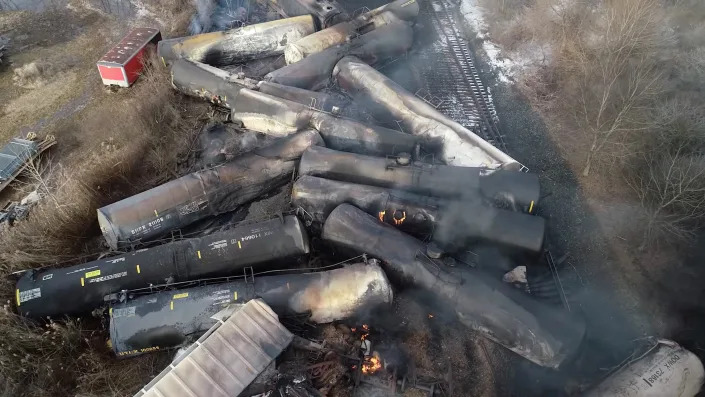
Drone footage shows derailed train cars on Feb. 6.
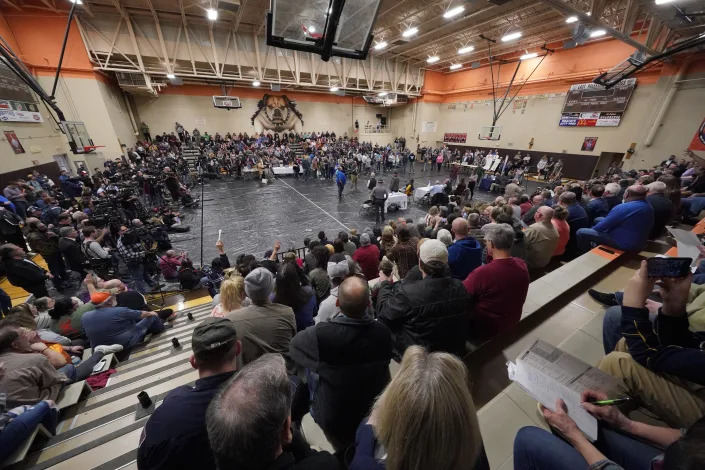
Trent Conaway, the mayor of East Palestine, leads a town hall meeting at a local high school on Feb. 15. (Gene J. Puskar/AP)
Experts told Stat News that the burning at the wreck site likely created dioxins, “a highly toxic, carcinogenic, and persistent compound released when polyvinyl chloride burns.” On Feb. 6, Norfolk Southern ordered a burn-off of chemicals at the site of the wreckage, which released more toxins into the air.
“I’m certain from the view of that black smoke plume [caused by a Feb. 6 burn-off] that it was a witch’s brew of chemicals on fire, and I’m quite certain dioxins would be among them,” Ted Schettler, science director at the environmental nonprofit Science and Environmental Health Network, told the outlet.
Former President Donald Trump visited East Palestine on Wednesday, bringing with him Trump-branded water and other supplies. Although footage on social media showed residents warmly greeting Trump, it’s his Department of Transportation that rolled back an Obama-era rule that required an upgrade in brakes for certain trains carrying flammable material.
That rule would not have prevented the East Palestine crash, because while the NTSB had urged the Obama administration to include more trains with dangerous cargo in its policy, the administration issued a less strict rule. When asked during his visit about criticisms that he had rolled back rail safety standards, Trump replied, “I had nothing to do with that,” despite repeatedly bragging about the number of regulations his administration had cut during his time in office.

Former President Donald Trump and his son Donald Trump Jr. at an event in East Palestine on Wednesday to address the recent derailment of a train carrying hazardous waste. (Alan Freed/Reuters)
While the Environmental Protection Agency and NTSB have been on the ground in the area since the accident, Transportation Secretary Pete Buttigieg made his first visit on Thursday. Buttigieg, who did not comment on the crash until 10 days after the incident, has faced bipartisan criticism for his response to the derailment. He told CBS News on Tuesday that not speaking out sooner was a “lesson learned.”
“This morning I’m in East Palestine, Ohio, to see the site of the Norfolk Southern derailment, hear updates from investigators, and meet first responders,” Buttigieg tweeted early Thursday. “[The Department of Transportation] will continue its work to ensure safety and accountability.”
Ohio Gov. Mike DeWine, a Republican, said President Biden was in touch with him in the aftermath of the crash and had offered whatever support the state needed. However, in a Monday interview with Fox News, East Palestine Mayor Trent Conaway said Biden visiting Ukraine before East Palestine was “the biggest slap in the face that tells you right now he doesn’t care about us.”
Conaway said the following day that he would welcome Biden to his town and was very frustrated at the time he made the comments, but that he stood by them.
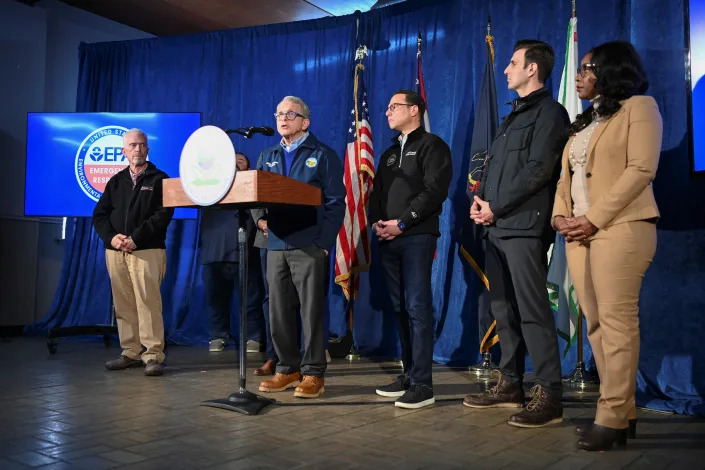
Ohio Gov. Mike DeWine, flanked by other local, state and national leaders, at a news conference Tuesday to address the train derailment. (Alan Freed/Reuters)
The federal response grew more aggressive on Tuesday after EPA Administrator Michael Regan visited East Palestine late last week and vowed to hold the rail company responsible.
On Tuesday, the Transportation Department released a set of proposals meant to increase rail safety, while the EPA announced it was taking over the cleanup effort, meaning the organization would have to approve Norfolk Southern’s plans and could issue its own guidance if it isn’t satisfied. Additionally, a clinic operated by the Department of Health and Human Services and the Ohio Department of Health opened in town the same day.
Pennsylvania Gov. Josh Shapiro, a Democrat, said this week that his state was investigating whether criminal charges against Norfolk Southern were warranted.
“We made a criminal referral to the office of attorney general. They’ll determine whether or not there was criminal activity,” he told NPR. "What I know is that Norfolk Southern is governed every day, not by caring about the communities that they send their trains through, but by corporate greed.”
Earlier warning might have spared Ohio a derailment, U.S. investigator says
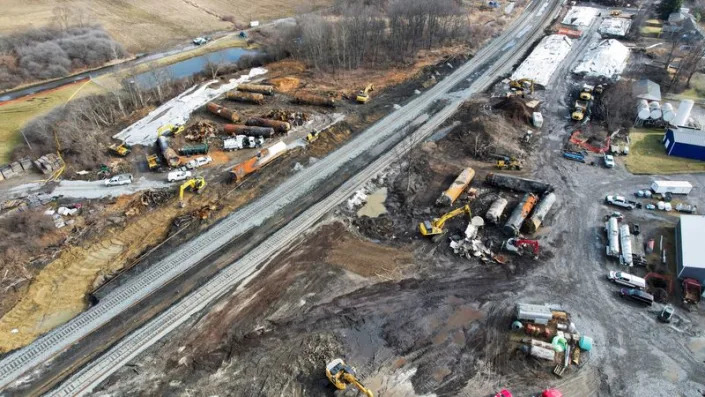


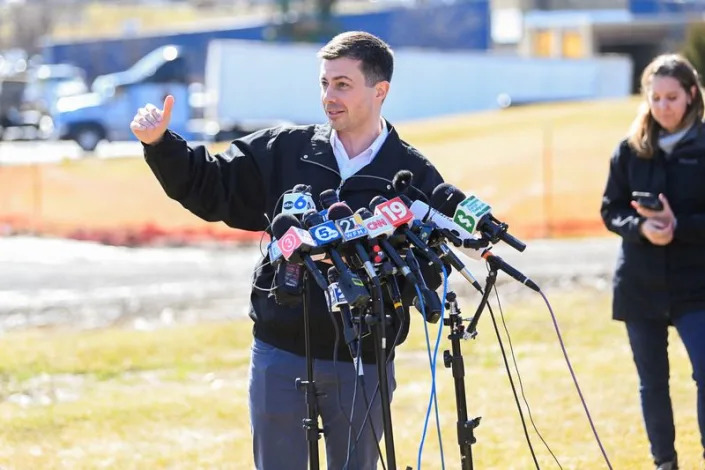

Thu, February 23, 2023
By Julio Cesar Chavez and Brad Brooks
EAST PALESTINE, Ohio (Reuters) -A U.S. train derailment that spilled toxic chemicals in an Ohio town might have been avoided if the railway company's alarm system had given engineers an earlier warning that bearings were overheating, the chair of the National Transportation Safety Board said on Thursday with the release of a preliminary investigation.
"Had there been a detector earlier, that derailment may not have occurred," NTSB Chair Jennifer Homendy told reporters in Washington. The incident prompted the evacuation of thousands of people and ignited health concerns.
While stressing a final report on the Feb. 3 derailment in East Palestine could be 18 months away, she said the NTSB could recommend that railroad companies lower the temperature thresholds that would trigger an alarm about overheated bearings.
Norfolk Southern Corp, the operator of the train, said in an emailed statement that its system to detect overheated bearings was operating normally in the area where the accident took place and said its warning system is among the most sensitive in the industry.
Norfolk Southern said it is cooperating fully with the NTSB.
The derailment has sparked a political battle and a blame game over railroad safety regulations, with residents voicing deep concern over the long-term health impact of the millions of pounds of carcinogenic chemicals spilled in their town.
U.S. Transportation Secretary Pete Buttigieg toured the wreckage on Thursday and took aim at freight rail companies over their responses to efforts to improve safety regulations.
Wearing a hard hat and orange safety vest while he met with NTSB staff, Buttigieg told reporters: "Norfolk Southern and the other freight rail companies need to stop fighting us every time we try to do a regulation."
Norfolk Southern's chief executive apologized on Wednesday at a CNN town hall event that highlighted residents' concerns about soil and ground water contamination.
Homendy said that in 2021 there were 868 derailments across the United States of freight cars in the same class as the Norfolk Southern train that wrecked, a number she said was far too high and the result of both the industry and government not implementing previous NTSB safety recommendations.
The rail industry had said 99.9% of all hazardous material shipments reached their destination without incident and the hazmat accident rate has declined by 55% since 2012.
In its preliminary report, the NTSB said the train engineer applied brakes as soon as an alarm rang on Feb. 3 to warn of an overheated axle on the Norfolk Southern train.
RARE HEARING SCHEDULED
The NTSB said "defect detectors" showed the axle and wheel bearing starting to heat up about 30 miles (48 kilometers) from the derailment site, but not to levels that would have triggered the audible alarm to warn the train engineer that far away.
Each individual railroad company determines its own temperature thresholds for when alarms are triggered.
Before the derailment, temperature measurements on the Norfolk Southern train's suspect wheel were doubling every 10 miles in the lead-up to the derailment, the NTSB said.
Norfolk Southern, in its statement on Thursday, said it is now inspecting all of the nearly 1,000 wayside heat detectors on its system, on top of regular inspections every 30 days.
The NTSB said it would hold a rare "investigative field hearing" near the derailment site in East Palestine and call witnesses. The board said all parties involved in the derailment were fully cooperating with its investigation.
Some rail safety requirements were withdrawn under Republican former President Donald Trump. Some Republican critics of the East Palestine response who previously opposed rail regulations have now expressed openness to new rules.
The Democratic Biden administration had been criticized for not having made a high-level visit sooner. Buttigieg on Thursday said he had not wanted to make an earlier visit that might have impeded the emergency response.
The NTSB also said it was investigating whether pressure relief valves on train cars carrying the toxic chemical vinyl chloride functioned properly following the wreck and subsequent fire.
Experts have said that if those valves had functioned properly, authorities may not have needed to drain upward of 1.1 million pounds of vinyl chloride from cars and purposefully set it ablaze, contaminating the environment.
President Joe Biden and his administration have said Norfolk Southern must pay for the damage and clean-up efforts. The EPA ordered company officials to attend town hall events after executives failed to attend an earlier meeting in East Palestine.
Russell Quimby, a retired NTSB investigator, said rail companies should monitor differences in temperature readings between the sensors spaced along a rail line, which could give an early warning that a bearing is failing, rather than wait for a bearing to hit a high temperature to sound an alarm.
"They start slow, but the longer it (the train) goes, the quicker they fail," Quimby told Reuters. "They stop heating up if they stop the train."
(Reporting by Julio-Cesar Chavez in East Palestine, Brad Brooks in Lubbock, Texas, Lisa Baertlein in Los Angeles and Susan Heavey in Washington; Editing by Donna Bryson, Howard Goller and Leslie Adler)
NTSB chair: East Palestine derailment was '100% preventable'
Christopher Wilson
·Senior Writer
Thu, February 23, 2023
While not reaching a conclusive reason as to why a Norfolk Southern train derailed in Ohio earlier this month, the National Transportation Safety Board said Thursday morning that it was continuing to look at an overheated wheel bearing on the first car to go off the tracks.
In a preliminary report, the NTSB wrote that it had identified “a wheel bearing in the final stage of overheat failure moments before the derailment” on the 23rd car, the first to derail. The report said “hot bearing detectors” picked up a temperature 253 degrees above normal prior to the derailment. The train was traveling at 47 mph, just below the 50 mph speed limit.
Portions of a Norfolk Southern freight train that derailed the previous night in East Palestine, Ohio, still on fire on Feb. 4. (Gene J. Puskar/AP)
Sensors showed the bearing heating up for miles before the crash, but it spiked sharply immediately before the accident. The crew heeded the final warning and tried to stop the train for an inspection.
“After the train stopped, the crew observed fire and smoke and notified the Cleveland East dispatcher of a possible derailment,” read the report. “With dispatcher authorization, the crew applied handbrakes to the two railcars at the head of the train, uncoupled the head-end locomotives, and moved the locomotives about 1 mile from the uncoupled railcars. Responders arrived at the derailment site and began response efforts.”
The NTSB noted that security footage — previously reviewed by the Pittsburgh Post-Gazette — showed that the train had been traveling with a “glowing axle” for at least 20 miles prior to the derailment near East Palestine, a town of about 4,700 people. The NTSB said it had collected the bearing and the affected wheel set for further examination.
Drone footage shows derailed train cars on Feb. 6.
(NTSBGov/Handout via Reuters)
The Norfolk Southern train derailed minutes from the Ohio-Pennsylvania border on the evening of Feb. 3, with the governors of both states issuing a joint evacuation order for a roughly 1-mile radius. On Feb. 6, the railroad company burned off five tankers full of vinyl chloride in what it said was an effort to avoid a catastrophic explosion, resulting in the images of a giant toxic smoke plume that drew attention to the situation.
The NTSB said that going forward the investigation will focus on “the wheelset and bearing and tank car design and derailment damage” as well as a review of the accident response, including the “venting and burning of the vinyl chloride, railcar design and maintenance procedures and practices, [Norfolk Southern’s] use of wayside defect detectors and … railcar inspection practices.”
Norfolk Southern has been accused of prioritizing the reopening of the railway over handling the situation as safely as it could. The East Palestine accident is at least the fourth Norfolk Southern derailment in Ohio since the fall.
ProPublica reported Wednesday that the company has a policy that allows crews to “ignore alerts from train track sensors designed to flag potential mechanical problems,” including in one instance that preceded an October derailment in the state that was still not completely cleaned up as of earlier this month.
While local, state and federal officials have all assured residents the air and water there is safe, there have been continued reports of rashes, headaches and other ailments, in addition to the smell of chemicals in the air. Ohio officials have also said that more than 3,000 fish had died in the immediate aftermath of the accident, and residents have reported seeing sick or dead animals.
The Norfolk Southern train derailed minutes from the Ohio-Pennsylvania border on the evening of Feb. 3, with the governors of both states issuing a joint evacuation order for a roughly 1-mile radius. On Feb. 6, the railroad company burned off five tankers full of vinyl chloride in what it said was an effort to avoid a catastrophic explosion, resulting in the images of a giant toxic smoke plume that drew attention to the situation.
The NTSB said that going forward the investigation will focus on “the wheelset and bearing and tank car design and derailment damage” as well as a review of the accident response, including the “venting and burning of the vinyl chloride, railcar design and maintenance procedures and practices, [Norfolk Southern’s] use of wayside defect detectors and … railcar inspection practices.”
Norfolk Southern has been accused of prioritizing the reopening of the railway over handling the situation as safely as it could. The East Palestine accident is at least the fourth Norfolk Southern derailment in Ohio since the fall.
ProPublica reported Wednesday that the company has a policy that allows crews to “ignore alerts from train track sensors designed to flag potential mechanical problems,” including in one instance that preceded an October derailment in the state that was still not completely cleaned up as of earlier this month.
While local, state and federal officials have all assured residents the air and water there is safe, there have been continued reports of rashes, headaches and other ailments, in addition to the smell of chemicals in the air. Ohio officials have also said that more than 3,000 fish had died in the immediate aftermath of the accident, and residents have reported seeing sick or dead animals.
Trent Conaway, the mayor of East Palestine, leads a town hall meeting at a local high school on Feb. 15. (Gene J. Puskar/AP)
Experts told Stat News that the burning at the wreck site likely created dioxins, “a highly toxic, carcinogenic, and persistent compound released when polyvinyl chloride burns.” On Feb. 6, Norfolk Southern ordered a burn-off of chemicals at the site of the wreckage, which released more toxins into the air.
“I’m certain from the view of that black smoke plume [caused by a Feb. 6 burn-off] that it was a witch’s brew of chemicals on fire, and I’m quite certain dioxins would be among them,” Ted Schettler, science director at the environmental nonprofit Science and Environmental Health Network, told the outlet.
Former President Donald Trump visited East Palestine on Wednesday, bringing with him Trump-branded water and other supplies. Although footage on social media showed residents warmly greeting Trump, it’s his Department of Transportation that rolled back an Obama-era rule that required an upgrade in brakes for certain trains carrying flammable material.
That rule would not have prevented the East Palestine crash, because while the NTSB had urged the Obama administration to include more trains with dangerous cargo in its policy, the administration issued a less strict rule. When asked during his visit about criticisms that he had rolled back rail safety standards, Trump replied, “I had nothing to do with that,” despite repeatedly bragging about the number of regulations his administration had cut during his time in office.
Former President Donald Trump and his son Donald Trump Jr. at an event in East Palestine on Wednesday to address the recent derailment of a train carrying hazardous waste. (Alan Freed/Reuters)
While the Environmental Protection Agency and NTSB have been on the ground in the area since the accident, Transportation Secretary Pete Buttigieg made his first visit on Thursday. Buttigieg, who did not comment on the crash until 10 days after the incident, has faced bipartisan criticism for his response to the derailment. He told CBS News on Tuesday that not speaking out sooner was a “lesson learned.”
“This morning I’m in East Palestine, Ohio, to see the site of the Norfolk Southern derailment, hear updates from investigators, and meet first responders,” Buttigieg tweeted early Thursday. “[The Department of Transportation] will continue its work to ensure safety and accountability.”
Ohio Gov. Mike DeWine, a Republican, said President Biden was in touch with him in the aftermath of the crash and had offered whatever support the state needed. However, in a Monday interview with Fox News, East Palestine Mayor Trent Conaway said Biden visiting Ukraine before East Palestine was “the biggest slap in the face that tells you right now he doesn’t care about us.”
Conaway said the following day that he would welcome Biden to his town and was very frustrated at the time he made the comments, but that he stood by them.
Ohio Gov. Mike DeWine, flanked by other local, state and national leaders, at a news conference Tuesday to address the train derailment. (Alan Freed/Reuters)
The federal response grew more aggressive on Tuesday after EPA Administrator Michael Regan visited East Palestine late last week and vowed to hold the rail company responsible.
On Tuesday, the Transportation Department released a set of proposals meant to increase rail safety, while the EPA announced it was taking over the cleanup effort, meaning the organization would have to approve Norfolk Southern’s plans and could issue its own guidance if it isn’t satisfied. Additionally, a clinic operated by the Department of Health and Human Services and the Ohio Department of Health opened in town the same day.
Pennsylvania Gov. Josh Shapiro, a Democrat, said this week that his state was investigating whether criminal charges against Norfolk Southern were warranted.
“We made a criminal referral to the office of attorney general. They’ll determine whether or not there was criminal activity,” he told NPR. "What I know is that Norfolk Southern is governed every day, not by caring about the communities that they send their trains through, but by corporate greed.”
Earlier warning might have spared Ohio a derailment, U.S. investigator says





Thu, February 23, 2023
By Julio Cesar Chavez and Brad Brooks
EAST PALESTINE, Ohio (Reuters) -A U.S. train derailment that spilled toxic chemicals in an Ohio town might have been avoided if the railway company's alarm system had given engineers an earlier warning that bearings were overheating, the chair of the National Transportation Safety Board said on Thursday with the release of a preliminary investigation.
"Had there been a detector earlier, that derailment may not have occurred," NTSB Chair Jennifer Homendy told reporters in Washington. The incident prompted the evacuation of thousands of people and ignited health concerns.
While stressing a final report on the Feb. 3 derailment in East Palestine could be 18 months away, she said the NTSB could recommend that railroad companies lower the temperature thresholds that would trigger an alarm about overheated bearings.
Norfolk Southern Corp, the operator of the train, said in an emailed statement that its system to detect overheated bearings was operating normally in the area where the accident took place and said its warning system is among the most sensitive in the industry.
Norfolk Southern said it is cooperating fully with the NTSB.
The derailment has sparked a political battle and a blame game over railroad safety regulations, with residents voicing deep concern over the long-term health impact of the millions of pounds of carcinogenic chemicals spilled in their town.
U.S. Transportation Secretary Pete Buttigieg toured the wreckage on Thursday and took aim at freight rail companies over their responses to efforts to improve safety regulations.
Wearing a hard hat and orange safety vest while he met with NTSB staff, Buttigieg told reporters: "Norfolk Southern and the other freight rail companies need to stop fighting us every time we try to do a regulation."
Norfolk Southern's chief executive apologized on Wednesday at a CNN town hall event that highlighted residents' concerns about soil and ground water contamination.
Homendy said that in 2021 there were 868 derailments across the United States of freight cars in the same class as the Norfolk Southern train that wrecked, a number she said was far too high and the result of both the industry and government not implementing previous NTSB safety recommendations.
The rail industry had said 99.9% of all hazardous material shipments reached their destination without incident and the hazmat accident rate has declined by 55% since 2012.
In its preliminary report, the NTSB said the train engineer applied brakes as soon as an alarm rang on Feb. 3 to warn of an overheated axle on the Norfolk Southern train.
RARE HEARING SCHEDULED
The NTSB said "defect detectors" showed the axle and wheel bearing starting to heat up about 30 miles (48 kilometers) from the derailment site, but not to levels that would have triggered the audible alarm to warn the train engineer that far away.
Each individual railroad company determines its own temperature thresholds for when alarms are triggered.
Before the derailment, temperature measurements on the Norfolk Southern train's suspect wheel were doubling every 10 miles in the lead-up to the derailment, the NTSB said.
Norfolk Southern, in its statement on Thursday, said it is now inspecting all of the nearly 1,000 wayside heat detectors on its system, on top of regular inspections every 30 days.
The NTSB said it would hold a rare "investigative field hearing" near the derailment site in East Palestine and call witnesses. The board said all parties involved in the derailment were fully cooperating with its investigation.
Some rail safety requirements were withdrawn under Republican former President Donald Trump. Some Republican critics of the East Palestine response who previously opposed rail regulations have now expressed openness to new rules.
The Democratic Biden administration had been criticized for not having made a high-level visit sooner. Buttigieg on Thursday said he had not wanted to make an earlier visit that might have impeded the emergency response.
The NTSB also said it was investigating whether pressure relief valves on train cars carrying the toxic chemical vinyl chloride functioned properly following the wreck and subsequent fire.
Experts have said that if those valves had functioned properly, authorities may not have needed to drain upward of 1.1 million pounds of vinyl chloride from cars and purposefully set it ablaze, contaminating the environment.
President Joe Biden and his administration have said Norfolk Southern must pay for the damage and clean-up efforts. The EPA ordered company officials to attend town hall events after executives failed to attend an earlier meeting in East Palestine.
Russell Quimby, a retired NTSB investigator, said rail companies should monitor differences in temperature readings between the sensors spaced along a rail line, which could give an early warning that a bearing is failing, rather than wait for a bearing to hit a high temperature to sound an alarm.
"They start slow, but the longer it (the train) goes, the quicker they fail," Quimby told Reuters. "They stop heating up if they stop the train."
(Reporting by Julio-Cesar Chavez in East Palestine, Brad Brooks in Lubbock, Texas, Lisa Baertlein in Los Angeles and Susan Heavey in Washington; Editing by Donna Bryson, Howard Goller and Leslie Adler)
No comments:
Post a Comment